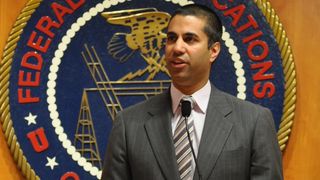Pai Signals It's Time for Transparency Regs on Edge

FCC chair Ajit Pai has some advice for legislators preparing for a Sept. 5 hearing with some of the edge's biggest players, including Amazon and Twitter: Get some answers on allegations of social media sites censoring conservative speech, and seriously consider applying transparency rules about how they conduct their business similar to those the FCC has imposed on ISPs.
Related: Pai Says Twitter is Bigger Threat to Open Net Than ISPs
That came in a blog post from the chairman on the eve of that hearing in the Senate Intelligence Committee on Foreign Influence Operations' Use of Social Media Platforms.
Related: Google's Page Only 'Maybe' for Senate Hearing
The chairman said he was not calling for the kind of utility-style regulations that his FCC has just removed from ISPs, especially since he said those companies can make "certain business judgments about content on their sites."
But he did say that "we need to seriously think about whether the time has come for these companies to abide by new transparency obligations. After all, just as is the case with respect to broadband providers, consumers need accurate information in order to make educated choices about whether and how to use these tech giants’ platforms."
Pai posed his comments mostly in the form of questions, but it was not hard to divine his opinion on the subject.
Broadcasting & Cable Newsletter
The smarter way to stay on top of broadcasting and cable industry. Sign up below
"Currently, the FCC imposes strict transparency requirements on companies that operate broadband networks — how they manage their networks, performance characteristics, and the like. Yet consumers have virtually no insight into similar business practices by tech giants. Do steps need to be taken to ensure that consumers receive more information about how these companies operate?"
He pointed out that "Tech giants have enormous and unprecedented insight into every part of our daily lives," and that he has already pointed out elsewhere that “recent experience shows that so-called edge providers are in fact deciding what content [we] see. These providers routinely block or discriminate against content they don’t like.”
Pai essentially summed up his point this way: "Are these tech giants running impartial digital platforms over which they don’t exercise editorial judgment when it comes to content? Or do they in fact decide what speech is allowed and what is not and discriminate based on ideology and/or political affiliation? And...where is the transparency?"
Pai said he hoped the hearings would help answer those questions, answers that will likely determine just how regulatory Washington becomes toward edge providers previously given something of a "garage innovators" pass from such scrutiny.
Sen. Klobuchar, who is also a member of the Commerce Committee, was actually the first to bring up Kavanaugh's view of the FCC's 2015 Open Internet Order in her opening statement, saying it was one of her concerns about the judge, as were a couple of Kavanaugh antitrust decisions that appeared to favor consolidation.
Contributing editor John Eggerton has been an editor and/or writer on media regulation, legislation and policy for over four decades, including covering the FCC, FTC, Congress, the major media trade associations, and the federal courts. In addition to Multichannel News and Broadcasting + Cable, his work has appeared in Radio World, TV Technology, TV Fax, This Week in Consumer Electronics, Variety and the Encyclopedia Britannica.

